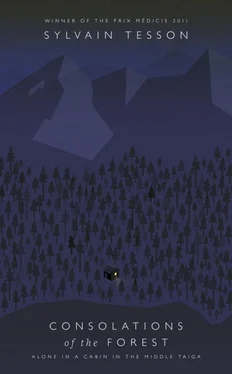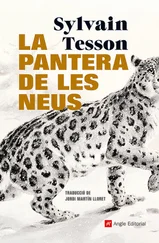The wind, still southerly, still smells like snow. The whiteness absorbs all sound. A rare silence reigns, and the air is pleasant. The thermometer shows 5°F.
19 MARCH
Last night, the cracking and booming woke me up. A colossal blow stronger than the rest shook the rafters of the cabin. Rebelling against its incarceration, the mass of water is banging on the lid.
Still snowing. More stillness. Before, I was travelling around like an arrow from a bow; now I’m a stake driven into the ground. And I’m vegetalizing. My being is taking root. I’m slowing down, drinking lots of tea, becoming hypersensitive to variations in the light. I’m not eating meat any more. My cabin: a hot-house.
| INTERIOR WORLD |
EXTERIOR WORLD |
| Maternal cabin |
Paternal lake |
| Heat |
Cold, dryness |
| Softness of wood |
Hardness of ice |
| Safety |
Constant danger |
| Purring of the stove |
Cracking, booming |
| Tears of resin on the beams |
Sparkling of the ice |
| Intellectual labour |
Physical labour |
| The body fattens |
The body dries out |
| The skin grows pale |
The skin weathers and chaps |
Spent a long time on firewood duty. Another tree cut down and up and stacked away. Then I cut paths with a shovel through the snow to the lakeshore, the banya and the woodpile. Tolstoy recommended working four hours a day to earn the right to shelter and sustenance.
Tonight, insomnia. I imagine the animals prowling or sleeping near the cabin at this moment. Minks no one wants to turn into coats, deer no one dreams of baking into pâtés, bears no one wants to kill to prove his virility.
20 MARCH
These days, titmice tap at the window every morning. Their beaks sound my wake-up alarm. Mild weather; I set out a stool a mile or so from the shore and smoke a Romeo y Julieta No. 2 (a bit dry) while admiring the view. The mountains, until now, have been something I’ve learned to climb, descend, navigate and survey. I have not yet ever looked at them.
In the evening, Casanova. Locked up in Venice ‘under the Leads’, a small prison in the Doge’s palace for detainees of high status and named for the lead plates on the roof, Casanova writes: ‘Believe that in order to be free, you need only believe that you are.’ His liking for sugar-coated sweets filled with a powder made from the beloved’s hair. (I should have brought some of those with me.) His critique, made to Voltaire, of human utopias: ‘Your premier passion is the love of humanity… but you can only love it as it is. It does not deserve the blessings you would bestow upon it… I have never laughed so heartily as at Don Quixote having a hard time defending himself from the galley slaves he has just generously set free.’
21 MARCH
Today is the first day of spring. Blue sky above and I’m heading into the woods. I climb up along a frozen river running down to the lake, it’s about a third of a mile north of my cabin.
Nature’s solitude meets mine. And our two solitudes confirm their existence. Labouring through the powdered snow, I recall Michel Tournier’s meditation on the joy of having a companion at one’s side – to convince oneself that the world does exist. I’m the only person looking at these ash trees with their vertically striped bark. The shrubs are hung with clumps of snow like Christmas ornaments, and the tortured silhouettes of larches make the valley seem like an etching; in Chinese drawings it always looks as though the rivers and mountains were suffering. The human gaze is a baptism, but at present, no one is helping mine to give life to these forms. I have only my field of vision to make the world appear . If there were two of us, we’d conjure up more things.
I make progress, I’m past the grove, it’s now out of sight. Does it still exist? If I had someone with me, I’d ask my companion to make sure the world doesn’t disappear behind me. Schopenhauer’s affirmation that the world exists only as the representation of the subject is an amusing view of the mind, but it’s claptrap. This forest – don’t I feel it radiating with all its strength behind my back?
When the valley grows tighter, at about 2,600 feet, I reach the summit of the sharp ridge. Ye gods of the slopes! What a struggle to climb 650 feet through this morass of dwarf pines buried in snow! A bright line snakes through the greenish-bronze mass of the taiga: it’s the ash trees with their blond branches, marking out the torrent’s course with a stream of honey.
I hike down again in two hours through long white alleys, empty esplanades and silent avenues. The forest in winter is a dead city. In the cabin, I plunge back into Casanova. After his visit to an important pilgrimage site, the Abbey of Einsiedeln in Switzerland: ‘I felt that to be happy, I needed nothing more than a library.’ A propos of a young Italian woman: ‘I felt mortified at having to leave her without having paid to her charms the principal homage they deserved.’ During Casanova’s travels he stays in Rome, Paris, Munich, Geneva, Venice and Naples. He speaks French, English, Italian and Latin. He meets Voltaire, Hume and Goldoni. He quotes Copernicus, Ariosto and Horace. His lovers are named Donna Lucrezia, Hedwige or Henriette. Two centuries later, technocrats announce that we must urgently ‘build Europe’.
At eight o’clock, I set my table. Tonight: soup, some pasta, Tabasco sauce, tea, eight or nine ounces of vodka and a Partagás Cuban in a tube. The Tabasco allows you to swallow anything at all with the impression that you’re actually eating something. Before going to sleep, I light a wax taper in front of the picture of my darling and smoke while watching the flame flicker over her face. Why do separated lovers complain? For consolation, they need only believe in the incarnation of being in the icon. I blow out the oil lamps and go to bed.
Today I have not harmed any living creatures on this planet. Do no harm . It’s strange that the desert anchorites never offer this beautiful concern among the explanations for their retreat. St Pachomius (the founder of Christian cenobitic monasticism), St Anthony, the Abbé de Rancé – these men speak of their hatred for their centuries, their battles with demons, their inner torment, their thirst for purity, their impatience to enter the Heavenly Realm – but never of the idea of living without harming anyone. No harm done . After a day in the cabin of North Cedar Cape, that’s what a man can tell himself when he looks in the mirror.
22 MARCH
A stormy night. The Russians call the wind roaring down the western mountainsides of Baikal the sarma . [8] Named for the River Sarma, which empties into the Small Sea Strait lying between Olkhon Island and the Western shore of Baikal, this wind comes roaring out of its valley as if from a cannon and can reach hurricane force. Among the coldest and strongest of Baikal’s winds, the Sarma is only one of many specific air currents created by the mountain ranges of Baikal, and they vary according to geographical location, time of year, time of day, temperature, air pressure, etc. For added insight into the tremendous ecosystem of Lake Baikal, see the entertaining essay on these quirky and often quite dangerous winds – the Verkhovik, Kultuk, Kharakhaiku, Gornaya and others – at www.magicbaikal.com/winds.php in the Baikal Winds section. Here, for example, is its description of the Sarma’s power: ‘Sarma can blow continuously for days and at times the wind is so strong that it can uproot trees, overturn boats, tear the roofs off houses and sweep cattle from the shores into the lake. The roofs of houses in the village of Sarma, situated in the valley of the river with the same name, are tied to the ground by the villagers.’
The clanking of the tools hanging underneath the eaves kept me awake for hours. How can the birds stay in their nests? Will they still be here, alive, tomorrow?
Читать дальше












